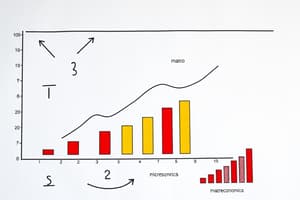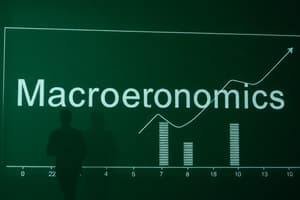Podcast
Questions and Answers
Which of the following is NOT a factor of production?
Which of the following is NOT a factor of production?
- Labor
- Innovation (correct)
- Capital
- Land
What is the primary function of monetary policy?
What is the primary function of monetary policy?
- To ensure the fair distribution of wealth.
- To protect consumers from unfair business practices.
- To control government spending and taxation.
- To regulate the supply of money in the economy. (correct)
Which economic sector involves the extraction of raw materials?
Which economic sector involves the extraction of raw materials?
- Quaternary Sector
- Primary Sector (correct)
- Tertiary Sector
- Secondary Sector
What term describes the cost of the best alternative foregone when making a choice?
What term describes the cost of the best alternative foregone when making a choice?
What is the main economic problem that explains the need for choices?
What is the main economic problem that explains the need for choices?
Study Notes
Introduction to Economics
- Economics studies how individuals, businesses, governments, and societies make choices about allocating resources to satisfy needs and wants.
- Economics is divided into microeconomics and macroeconomics.
Key Concepts in Economics
- Scarcity: Unlimited wants meet limited resources.
- Demand and Supply: The relationship between how much consumers want to buy and how much is available.
- Opportunity Cost: The value of the next best alternative given up when making a choice.
- Market Equilibrium: Where supply and demand are equal, determining prices.
- Factors of Production: Resources used to produce goods and services (land, labor, capital).
- Economic Systems: Different ways economies are organized (capitalist, socialist, mixed).
- Inflation: Rising prices, lowering the purchasing power of money.
- GDP (Gross Domestic Product): The total value of goods and services produced in a country.
- Fiscal Policy: Government decisions on taxes and spending to influence the economy.
- Monetary Policy: Central bank actions adjusting interest rates and money supply to control inflation.
Economic Sectors
- Primary Sector: Extracting natural resources (agriculture, fishing, mining).
- Secondary Sector: Manufacturing and processing raw materials into finished products.
- Tertiary Sector: Providing services (healthcare, education, retail, entertainment).
Conclusion
- Economics explains how resources are allocated and markets function.
- Understanding economic concepts enhances daily decision-making.
- Policies impact economic stability and growth.
Studying That Suits You
Use AI to generate personalized quizzes and flashcards to suit your learning preferences.




